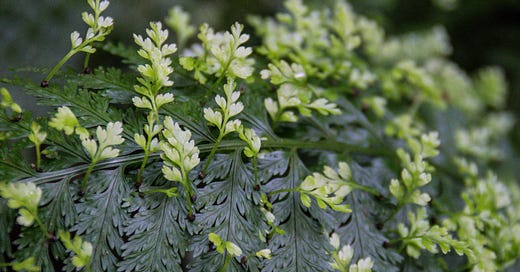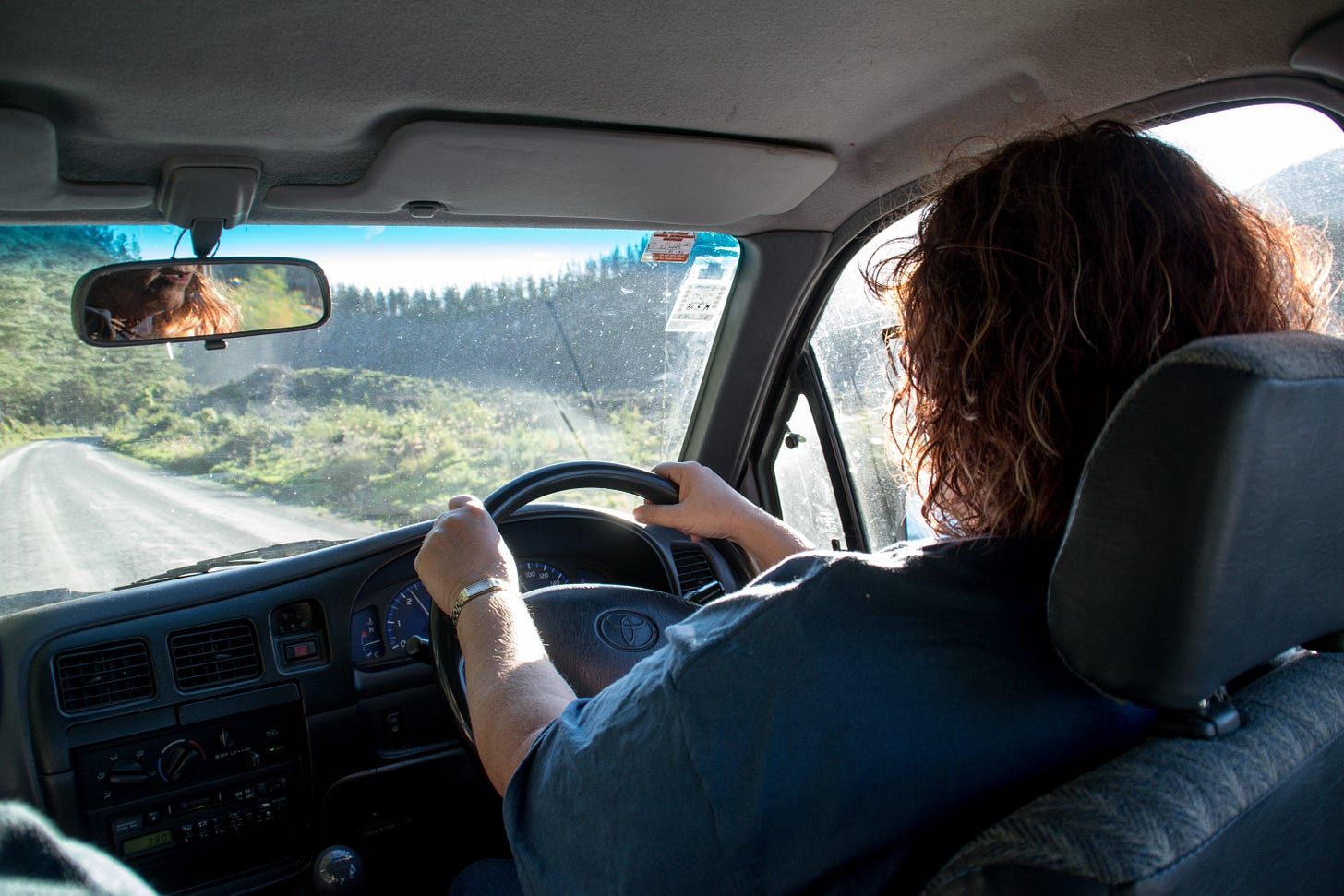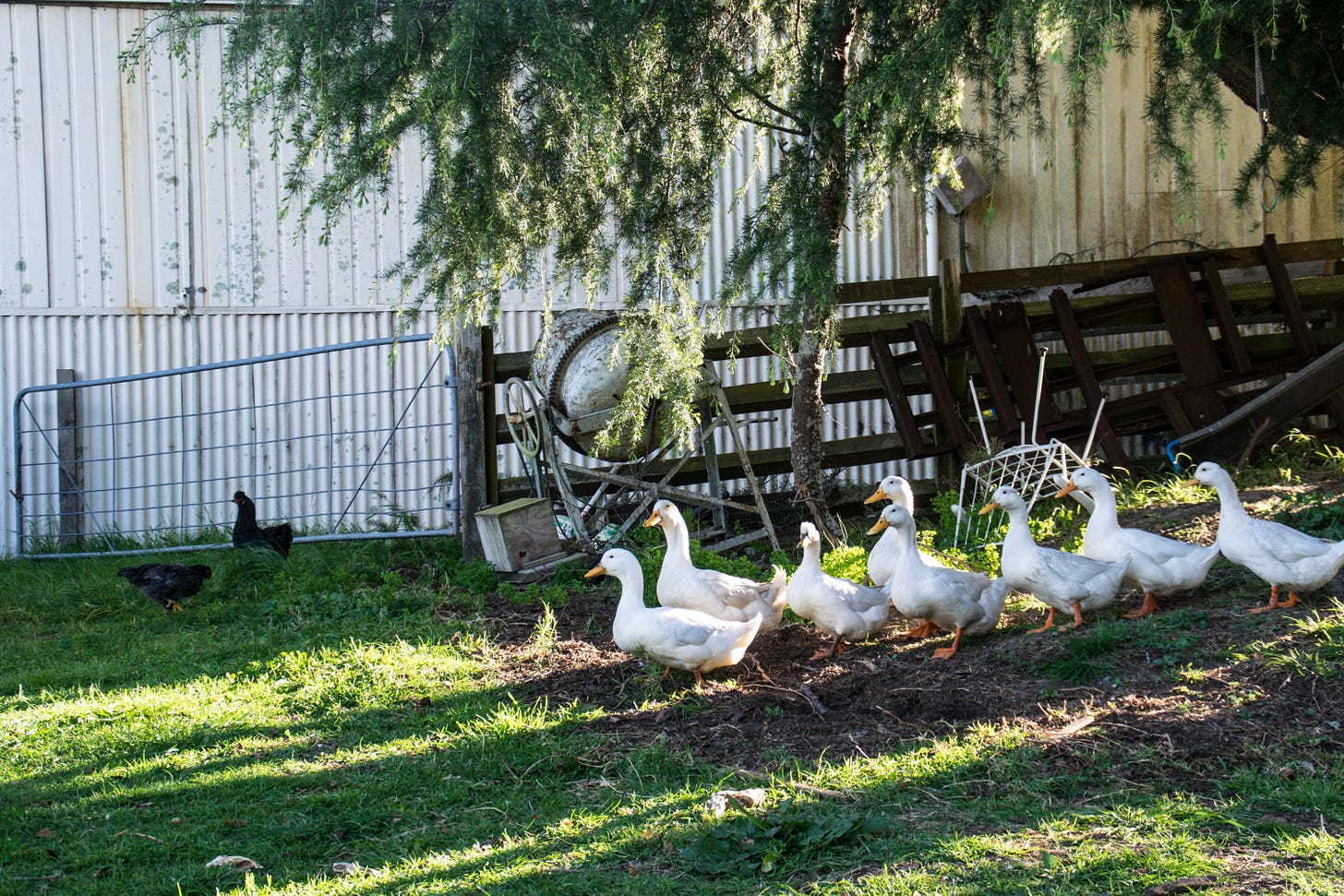Jenni Ratcliffe is a writer / photographer specialising in place, people, nature, and travel. She lives as a nomadic boater on the winding waters of the UK canals, talking with the birds and the busybodies. Her work has been featured in The Telegraph and Waterways World, as well as shortlisted for national prizes. Her concentration is on creative non-fiction and poetry.
‘Get in quick - people get killed here all the time!’ she stuffed our backpacks in the boot, looking over her shoulder and all around…
Under a nervous sky, I kicked an old bus stop with happily buzzing skin. We’d just taken a dip in a hot spring in the bush of Te Ika-a-Māui, Aotearoa – North Island, New Zealand—a glorious glide through reeds and sulphur plumes. There weren’t many roads to choose from: behind and in front. In some direction was Hobbiton, another the scorching Craters of the Moon, as well as the way we had fled from; that shady volunteer exchange host.
Thumbs outstretched, we waited. A white Ford trundled past as a Land Rover slowed; one curvy finger beckoned me inside, its owner's face tinted out of view. My partner stood up from his stoop, and they swerved off, whipping gravel into hail-stone. I raised my eyebrow at the casual human roulette we were playing.
The bus stop was wide with mullion struts but no glass. A silver fern’s curling tongue stroked its sides as the click, clock, and whistling Dalek tones of the tui bird led the band of a human-sparse landscape. The wild clawed at the sides of the tarmac, exacerbating its garishness. It streaked through it as though the land were the fur of a beast and the road a razored mistake. I guess this made us the fleas on the beast's back. Another white Ford passed in the opposite direction without pause. I began sizing up the shelter for our tent – double rain protection. It would do and would at least avoid running into wild boars... but we would be at risk of colliding with wild, dodgy people who may be cruising the road at night.
‘Where ya getting to?’
Curly, bloodshot hair poked out of the window. White Ford – so it had been the same car, doubling back on itself.
‘Wherever’
She told us two tourists had gone missing on this road only a month ago, that she lived here but would take us there instead. She was telling us practical information as we were listening for clues about if she could be trusted. A one-second psychological discussion, a micro-ballet between two sets of irises and eyelashes. His eyes meet mine steadily, making that hairline squint: agreed, she seems alright. Hitchhiking is like haggling at a market stall. The key, like bargain hunting, is being able to say ‘no’ and walk away unscathed. This time, we let ourselves be sold and hoped for the best.
‘We’ll smell Rotorua before you see it.’
Her laughter came throaty and raucous. Still, she was clearly nervous. I took note. She had picked us up but was being edgy. The driver has the control. I began the usual analysis. Considering: ‘are you anxious in a healthy way (because I’m a total stranger sitting behind you in a fast-moving heavy machine), or are you crackers?’
Whakarewarewa forest flashed past us, greens fizzing in luminosity. Despite the pewter sky, a tinge of turquoise glimmered somewhere between cloud and crinkled redwoods. The geothermal breeze fragrantly seeped through cracks in the vents as rain broke into a tinny jig on the roof. The smell distinctly brought summer-sweaty egg and cress sandwiches to mind. I forget what we spoke about, but we were crowing and cackling down the highway. Soon we were at our destination, all three of us going for a walk around a small yellow-smelling park with ice creams.
One moment of trust turns into three weeks.
In Leeann and Dave's yard were a cow, chooks, cats, creepy crawlers, tamarillos and macadamia trees. No one was surprised we had turned up, on the list of rescued and cared for things; wayward beings were regulars.
This was the New Zealand we’d come to reminisce about years later, the family that came to be our own, our neighbours. Our friends back in our other home. It was Leeann-land. Freshly brewed beer, logger-truck horns, unexpected waterfalls, mid-week wagyu beef, painting overalls and a purple house. A place ablaze by the warmth of kindred souls meeting accidentally.
At another time, in another country, sitting safely on the couch drinking tea with the intention of going nowhere - a message dinged onto my phone.
I’m back on that road with the jungle at my back, only no white Ford comes along. The storm weeps down on the bus shelter, and ice blows, drenching us. The shape of the island falls away as I imagine life without this encounter. Imagine it as though it were now. The tui continues to echo, intertwining with the heavy thrusted sigh of the kererū pigeon. They, sombrely, solidify ourselves as the only souls for miles. Strange. We’re taught to lust after landscapes void of humanity, told they’re the true natural beauty of this world. The beauty of that trip was finding humanity in an empty landscape that day.
Every friend you make is by chance. When you find them in the most unexpected creases of your journeys, it feels as though you’ve held hands with fate. These people become the chartered maps of our world. Not just a tale from our travels but imprints of culture. Imprints of who we are.
The fire dropped out of me, and I sat amongst its lumpy ashes for a good, still, while. Unable to swallow the lingering drip of tea on my tongue before it became stony and cold. A taste of gentleness weighed chalkily in my mind as I paced the room, waiting for my partner to finish work.
‘She took her own life,’ I explain through haggard tears. It seemed unfair; she had taken ours into her hands, and it had been for the better. If I hadn’t stuck out my thumb, if I hadn’t decided to spin the wheel of fortune on a risky road, I would’ve known a different reality, a different country. It wouldn’t have been Leeann land.








